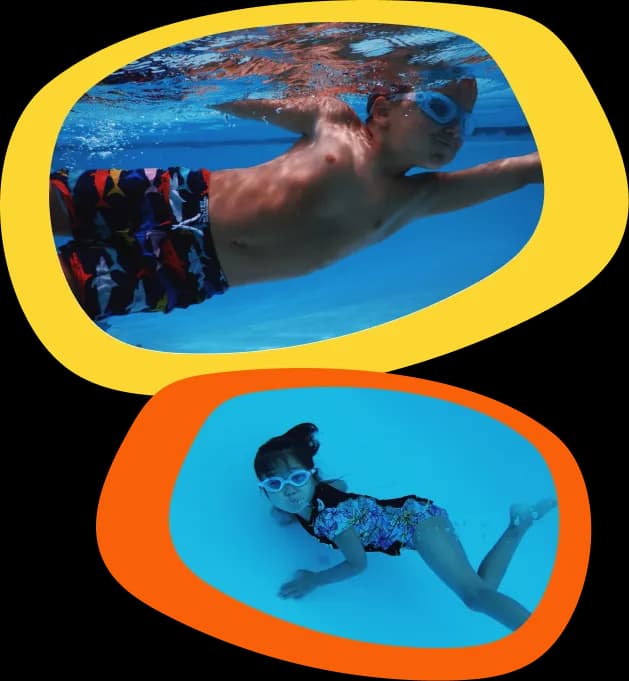Why isn't my child progressing in swim lessons

Written by Katie Jenkins — 4 min read

By Katie Jenkins, Baltimore, MD Area
Wow, my child has been in swim lessons week after week now, and he or she is still struggling with the same skills! What is going on?
The steps in learning how to swim are definitely non-linear, meaning that children learn in fits and starts; they may jump from a very basic skill to more advanced skills, regardless of what their prescribed level might be.
Whether your child is in a group lesson or a private swim lesson, at home or at a swim school, it can be challenging to figure out whether your child simply isn’t progressing, or if he or she is just struggling to master a gateway skill (one that will speed up their progression later).
Flip the script on the scary stuff
It can be scary for a new swimmer to be in water, an element that is not natural for us humans. In fact, it is quite normal for a child taking swimming lessons to be afraid of the water. In addition, children can sense fear on the part of the adults around them.
As a long-time swim instructor, I welcome and encourage parents to watch our swim lessons. However, sometimes the swim skills that are scary for a child (and therefore, for a parent as well) are best introduced as a fun game, with parents watching from a distance if they are also nervous.
Make the swim lesson fun!
For example, to introduce getting one’s face wet, I like to use coins on the pool steps. We start with picking up the ones on the highest step (with lots of praise and excitement!), and gradually work our way down to the lower steps. I also like to give them the pennies or nickels to keep from each level as it gets more challenging.
The more fun the swim lessons are for your child, the more we can disguise some of the scariness of being in water. Games and repetition encourage a child to spend more time in the water, whereas forcing a child to do something he or she is scared of may discourage them. Our goal is to keep the child in the water, so that he or she gets stronger in all of the swim skills presented.
Way to go!
It is important to give lots of praise for even the smallest skill acquisition, and show it off to parents at the end of the lesson. I have been teaching children to swim for more than thirty years, and have seen that each child learns at his or her own pace; praise for achievement can help ease the process.
Everyone involved in the swim lesson (child, parent(s) and swim instructor), must be willing to take a leap, be vulnerable, and maybe even a little scared, in order to make progress!
Muscle memory and practice
On average, it takes about three weeks of consistent practice to truly master any swimming skill.
While we swim instructors are always adding new skills to our lessons, we continue to practice and strengthen the ones the swimmer already has. This practice can look like repetition, but there is a purpose to it.
For instance, a big hurdle to learning to swim is being willing go under water. Often, this skill takes longer than some others; for example, kicking on a noodle.
Building blocks to success
You may notice that once your child is comfortable going under water, and perhaps blowing bubbles, they will nab other skills, like retrieving items on the bottom of the pool, very quickly.
With consistent practice, going under water and exhaling start to feel more natural, and rhythmic breathing can be introduced.
What is a plateau?
The concept of plateauing is familiar to the seasoned competitive swimmer.
A “plateau” is a period of time in training where a swimmer is working hard, but is not really showing objective, measurable improvement (in other words, faster times in their events). During plateaus, competitive swimmers must continue to practice and to make small, some might say miniscule, improvements to their technique.
Plateaus in swim lessons
Sometimes the child can (try to) finagle the swim instructor into doing the activities or skills that he or she enjoys, or feels confident in. If your child is in a plateau, it is incumbent on his or her swim instructor to get creative and find a new skill to work on; any new skill, as long as it is appropriate. The activities that are fun for the child can then be used as rewards for trying something new!
It can be difficult to be patient through periods like this in the swim lessons process. Frequent communication between swim instructor and parent is essential.
Practice makes perfect
Ideally, your swimmer has access to a pool and is able to work on their swimming ability between lessons.
Exploration of the water on a swimmer’s own terms - and at their own pace - can be less daunting than it is with a swim instructor. If family swim is a fun activity, learning new skills becomes more desirable.
Older siblings who have mastered swimming skills can also be a big help in pushing a swimmer along.
Water safety is a very important life skill. No matter the swimmer’s level, equal parts of courage and fun are the best way to continue making progress.
******************
About the Author:
Katie Jenkins is a Sunsational Swim School instructor in the Baltimore Metro area. Katie swam from age six to age twenty-four, and continues to participate in open water races. She has been teaching with Sunsational for a year, and has been a competitive swim coach for over thirty years. She loves being with kids and helping them master new skills!
Share on socials




